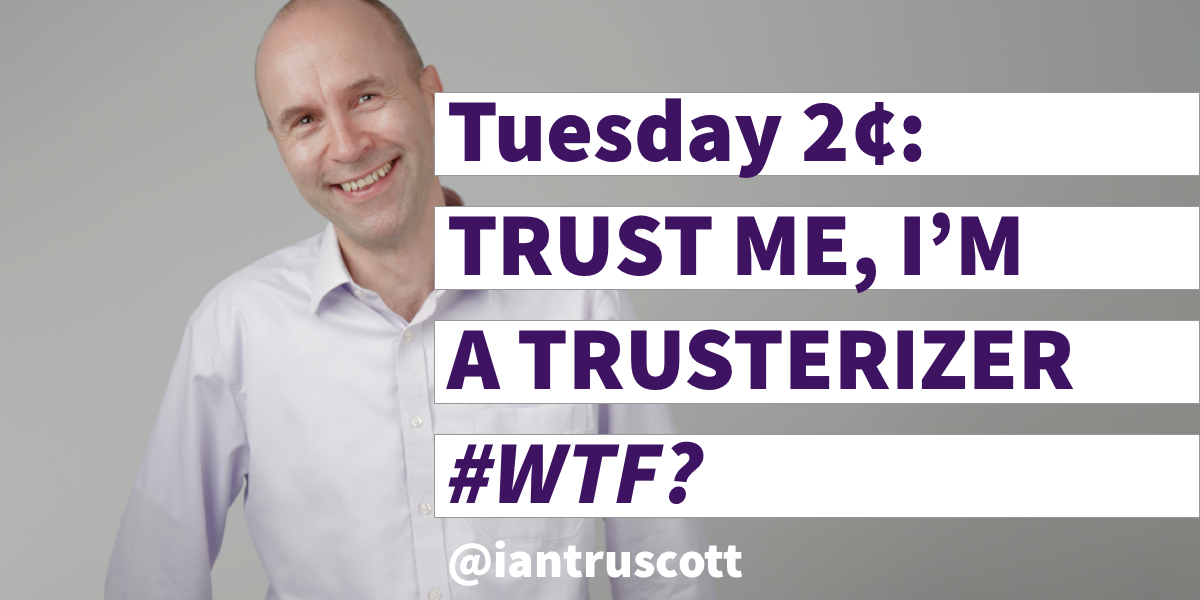This week I read the word “trusterizing”, my eyes rolled as we hand the world another reason not to trust marketing and so in this Tuesday 2¢ I focus on the importance of trust as a marketing goal.
Apparently, “trusterizing” – according to a marketer in Canne – is a thing. I presume this dreadful hack of our language was used to describe the goal of marketers to create trust. We are Trusterizers. Oh god no.
The truth, of course, is that trust is a really important part of the B2B buying process.
I’m working with a client right now that is choosing a marketing automation platform, one product is well known and the other not so much. Functionally both tick the boxes, the lesser known product would be way cheaper long term.
On paper it’s a close decision, but I can see in the eyes of the CEO and the continued questions I am getting about the lesser known product that there is something deeper happening, in his heart he trusts the better-known product and aspires to be a client of this vendor, emotionally there is no competition.
It’s the old “nobody got fired for buying IBM” behavior and it’s a phrase that has been applied to SAP, maybe Adobe, whoever is the gorilla within a market, people buy from the dominant player based on trust.
Disruptors in these markets have to win trust fast. I talk about Awareness, Revenue, and Trust (ART) as marketing goals a lot – but let’s face it without trust revenue ain’t happening and neither is positive awareness and advocacy. This has to be top of a B2B marketing leaders list.
I like this quote from The Trusted Advisor:
You don’t get a chance until someone trusts you enough to share their problem with you
And it’s so true, whatever you are selling B2B, the buyer has to trust you enough to share their problem, so you can move to the conversation that will build your credibility in solving it.
Facts, testimonials, case studies, influencer credibility, analyst relationships are all part of the mix for creating trust, as well as taking a strong view on how marketing activities, strategies, and campaigns are executed, to ensure they preserve the trustworthiness of the brand.
Plain speaking in the language of the consumer with empathy for their problems, being personable, consistent, transparent, authentic also plays heavy in developing trust.
I certainly don’t think describing this process as “trusterizing” or marketers as “trusterizers” will achieve this. It’s just another example of how, as an industry, we marketers seem to be terrible at this, making this business practice impenetrable with jargon, made up job titles, lacking in… trust.
Would you trust me with your trust if I was a trusterizer?
No?
(l do encourage you to read this article, by Jane Austin that goes on to poke at all the bullshit the author heard while in Canne that inspired this post).
Fancy more of this?
Subscribe to my Rockstar CMO Newsletter

I’m a 3xCMO, now a marketing strategy advisor and podcast host at Rockstar CMO. Although, I’m not a rock star, but a marketing leader, strategist, content marketer, columnist, speaker, industry watcher, and creator of ART (Awareness, Revenue, and Trust) for the companies I work with. But most of all, I am an enthusiastic tea drinker.
You can find me on LinkedIn, Twitter, or now Threads! – or listen to my weekly podcast at Rockstarcmo.com
The half-baked thoughts shared on this blog may not reflect those of my employer or clients, and if the topic of this article is interesting or you just want to say hello please get in touch.
